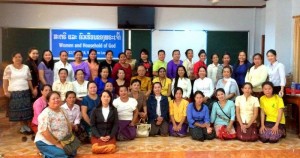Ecumenical Enablers Training for Women in Lao People’s Democratic Republic

Women leaders in the Bible; 'Miriam', 'Deborah' from the Old Testament, 'Mary and Martha' from the New Testament demonstrated distinct leadership qualities and their commitments for God’s mission should be a model for Christian women in any society, said Pastor Kummol of the Church of Christ in Thailand to a group of women at the ecumenical enablers’ training for women in the Lao People’s Democratic Republic.
The Christian Conference of Asia (CCA) organized an ecumenical enablers’ training for women leaders of the Lao Evangelical Church (LEC). The training focused on the theme “Women in the Household of God” held from 20th to 22nd January 2016 in Vientiane, Laos. About 47 women – pastors, church workers and lay leaders from different parts of Laos attended the training
Pastor Kummol added that, “These women were prophets, advisors, warriors and early church leaders and they demonstrated God given leadership skills in those times. God has given the same leadership skills to the women of today and they must use their talents in the household of God.
Rev. Dr. Khamphone Kounthapanaya, President of LEC, Pastor Kummol from Church of Christ in Thailand, and Ms. Sunila Ammar of CCA also provided leadership for the training.
Leadership of LEC and women’s committee expressed their deep gratitude for Christian Conference of Asia in facilitating the training first time for women in Laos. The participants opined that, “It is the first ever ecumenical training for women in Laos and the training was unique. It was mainly focusing on women’s concerns, especially re-reading the Bible with women’s perspective."
The Ecumenical Enablers Training of CCA aims at ecumenical formation at the grassroots levels and to provide non-formal theological orientation to church members in different countries, especially in contexts where the ecumenical movement is rather weak. These churches and councils lack ecumenical leadership and ecumenical theological education as many of the church leaders are providing pastoral cares and assistance without formal theological education or self-trained non-formally as they do not have access to the theological education.










